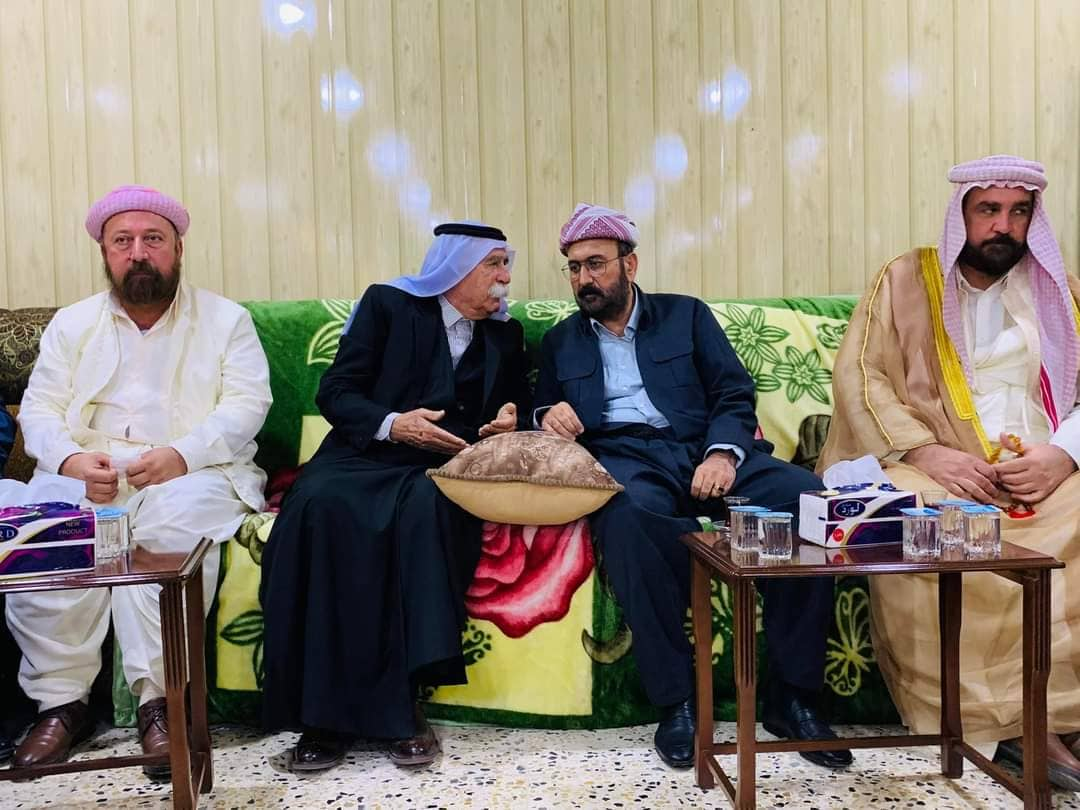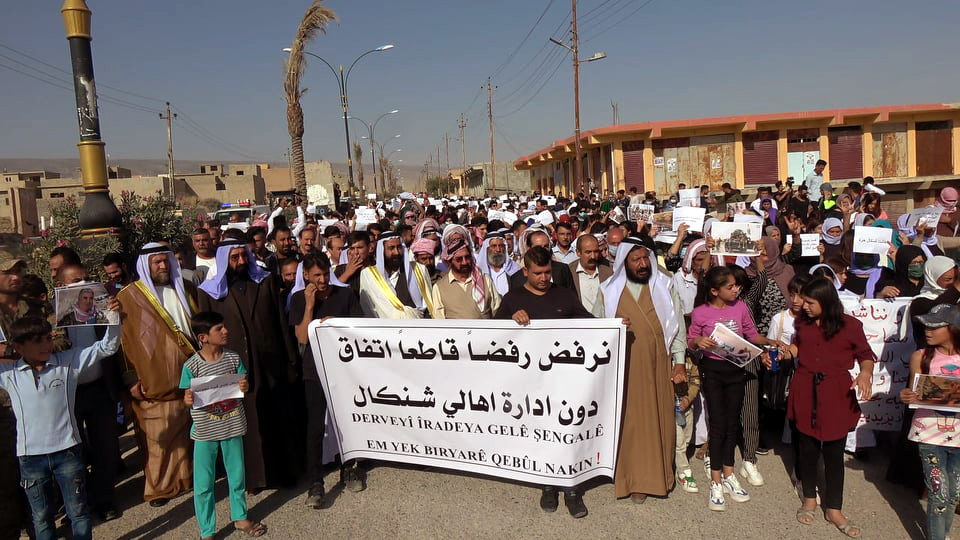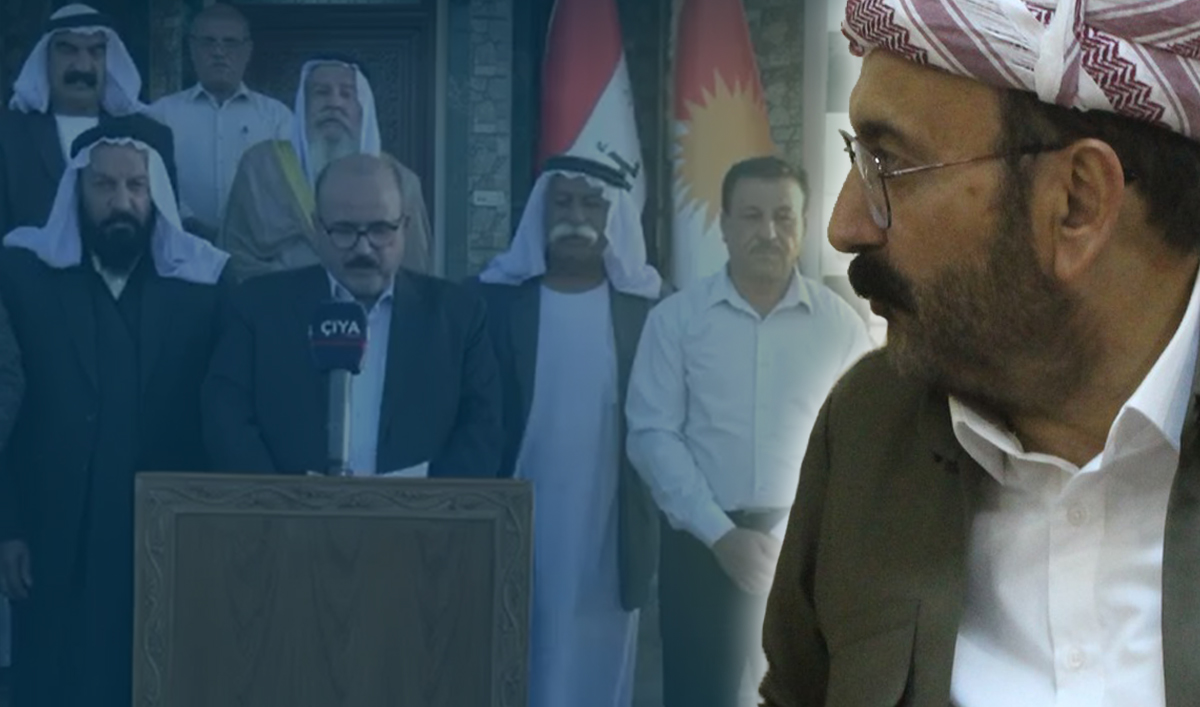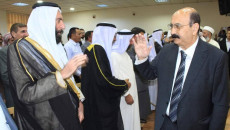The Emir of the Ezidis (Yazidis) in Iraq and the world is visiting Shingal (Sinjar) district, home to the Ezidi community in Ninewa province, for the first time in an effort to reconcile the Ezidis who reject his inauguration, but this opposition front refused to receive him, and some even warned him about the need to leave the district as soon as possible.
Hazem Tahsin Bey, the Emir of the Ezidis, arrived in Shingal on October 27, 2022 and first stopped at the cemetery of the victims of the village of Kocho, where extremist militants of the Islamic State ISIS left tens of mass graves, then held a series of meetings and decided to continue his meetings and activities over a period of three days.
“The Emir visited Shingal to unite the ranks of the Ezidis, carrying a message to all the people of Shingal that no decision would be taken from now on without taking the advice and opinions of the Shingalis,” Khairy Hussein, the secretary of Emir told (KirkukNow).
A part of the Ezidi community, including religious and social figures and a number of the tribal clans, refuse to recognize the election of the Emir and Baba Sheikh (spiritual leader) of the Ezidis, because their views are not taken into account.
Following the death of Mir Tahsin Beg, former Ezidi Emir (Prince), the Ezidis were divided into two fronts, Shingal and Sheikhan, with affiliation to several different political parties.
On August 4, 2019, at the shrine of Shabil Qasim in Shingal, a number of Ezidi clerics and personalities decided to appoint Naif Daud Salman as the Emir of Shingal and the formation of the emirate of the district under the authority and governance of the central government.
This was in response to the inauguration of Hazim Tahsin Beg as the Emir of the Ezidis in Iraq and the world on July 27, 2019.
The Emir (prince) of the Ezidis (Yazidis), in an initiative aimed at the unity of the religious community, gathered the majority of tribal chiefs of the districts of Shekhan of Duhok province and Sinjar (Shingal) district of Ninewa province in addition to the political parties and discussed the issue of resolving the situation in Shingal in terms of security and services.
The meeting was held on August 27 at the Lalish temple in Sheikhan, at the initiative of Mir Hazim Tahsin Beg, the Emir of the Ezidis in Iraq and the world.

Khairy Haji Mirza, head of the Qiran clan in Sinuny subdistrict of Shingal - one of the opponents - told (KirkukNow), "They asked us to meet with the emir, but I refused because his visit is political and will not lead to anything, so I will not participate in any meeting that includes statements without actions."
"When they appointed him as emir, they did not take our opinion, although I was not at the time with the inauguration of another emir in Shingal," Mirza added.
On Friday, October 28, the Yazidi Movement for Reform and Progress published a video rejecting Hazem Tahsin Beg’s visit to Shingal, describing it as a “conspiracy” and asking him to “leave Shingal immediately,” warning him of any consequences and repercussions due to the visit. The movement also stressed However, "Hazem Tahsin Beg was unfortunately appointed by a political party."
Hazem Tahsin Beg had previously sought to visit Shingal, but was unable to make the visit due to the rejection of the "opposition" front.
Prince Hazem Beg’s secretary pointed out that "the prince wants to see the problems of the people closely in order to convey their demands to the concerned authorities. He did not come for political purposes at all, but on the contrary, he wants to serve the people," explained Khairy Hussein, who accompanied Mir on his visit.
“The visit came at the request of the people and a number of religious and social figures," he added.
"The emir will not meet with any political parties or forces, and he will receive every visitor as an Ezidi and not as a representative of a party or political party. Therefore, he will visit within three days the largest number of complexes and villages of Shingal, according.”
Ezidis are an ethno-religious minority over half a million population, mostly residing in Shingal, in northern Iraqi province of Ninewa, and Shekhan district of Duhok Northern Province. The militants of Daesh extremist group in 2014 attacked their communities accusing them of being heretics, killing thousands of men and taking thousands of women and children as sex slaves, in an atrocity the U.N. described as genocide.
The Ezidi administration institution is made up of the Ezidi Spiritual Council, prince of Ezidis (Mir) who is the head of the spiritual council (leader of the community), Baba-Sheikh (the key religious figure), Minister Sheikh, and head of the seniors. They unanimously form the council and take the decisions.
In the wake of the attacks on Shingal and other areas of Ninewa province by the extremist militants of the Islamic State of Iraq and Syria ISIS, more than 350,000 Ezidis were displaced, 100,000 of whom migrated at the time outside Iraq. About 200,000 are still living in IDP camps in the Kurdistan Region of Iraq KRI up today.
The extremist militants of IS kidnapped six thousand Yazidis accusing them of being heretics, the fate of nearly half of whom is still unknown, according to the Kurdistan Regional Government KRG statistics.

On September 17, 2021, Baba Sheikh of the Ezidis, Ali Sheikh Elias, left Sheikhan district for two weeks, heading to Shingal with the aim of reconciliation between the Ezidis, but with the exception of addressing some social differences, his visit did not succeed in bridging the rift between the Ezidis of Shingal and Sheikhan and reconciling the opposition front.
Faisal Afdo, who identified himself as an independent activist in Shingal, told (KirkukNow), "The Emir's visit will not have results and will not change anything of the situation in Shingal, because the views of the Ezidis of Shingal were not taken into account in the inauguration of the Emir and they do not consider him worthy of that position."
Ali Ilyas was nominated as Baba Sheikh in a ritual on November 18th, 2020 in Lalish holy temple of the Ezidis in the district of Sheikhan, Duhok province.
A number of Ezidi tribes, clerics and community leaders reject the mechanism of appointing Baba Sheikh "for interference by political parties and disregard for their concerns."
The Foundation for the Administration of Yazidi Affairs in the Yazidi Spiritual Council is headed by the Emir of the Ezidis, and the institution includes Baba Sheikh, Sheikh Al-Wazir with the Chief Reciters (Qawal), and all decisions concerning the Yazidi component are issued by that institution.
Hasso Ibrahim, Deputy Chairman of the Autonomous Administration Council in Shingal - considered a party close to the Kurdistan Workers' Party PKK - told (KirkukNow) "We were not asked to meet with the Emir, and we are not against the refusal and prohibition of his visit by any person or entity, we hope that it will not be of any political motives or purposes behind the visit, and that the aim of the visit is to serve the people.”
“Our position towards the Emir of the Ezidis has not changed, and the Ezidi street does not consider him to be their Emir,” he stressed.
Following appointment of Baba Sheikh, a number of Shingal community leaders Early December have formed a new 'Ezidi Assembly' whose members were elected by the residents of the district, as a council to represent the locals and oversight the local administration.
Ezidism is an old Middle Eastern monotheistic ethnic religion and is based on belief in one God who created the world and entrusted it into the care of seven Holy Beings, known as Angels. The outstanding among these angels is Melek Taus who is the leader and has authority over the world.
Ezidis speak Kurmanji, one of the two main Kurdish dialects. The majority of Ezidis consider Ezidism both a distinct ethnic and cultural identity and do not identify themselves as Kurds.






